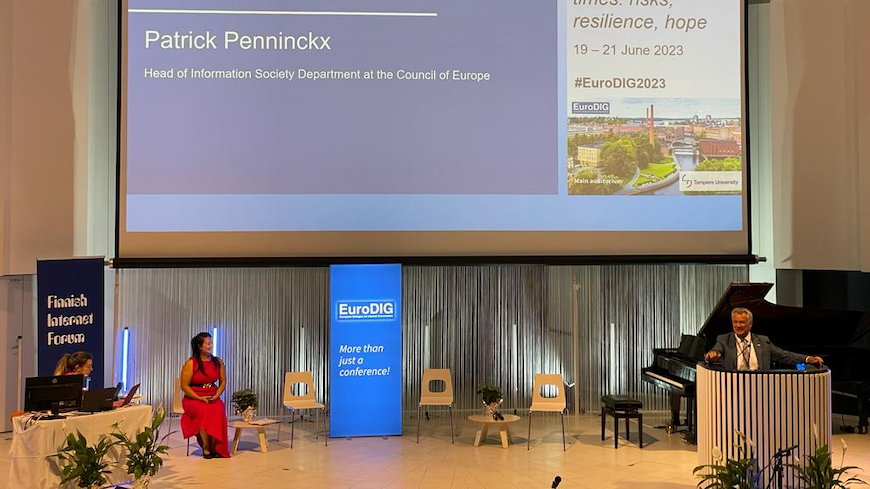The Council of Europe demonstrated its strong commitment to bolstering digital governance and combating cybercrime through its active participation in this year's EuroDIG (European Dialogue on Internet Governance) conference, held in Tampere from June 19-21. The conference brought together influential figures and stakeholders from the digital realm to discuss pressing issues and formulate strategies for a secure and inclusive digital future.
Patrick Penninckx, Head of the Information Society Department at the Council of Europe, took the central stage as he moderated the Opening Plenary on Digital Cooperation between African and European Parliamentarians. With insightful debates on the importance of cooperation in countering cybercrime, Mr Penninckx set the stage for engaging discussions among stakeholders from both continents.
The Council of Europe's involvement extended beyond the opening session, as Mr Penninckx actively participated in a session focused on Civil society oversight of law enforcement actions in cyberspace. Emphasizing the alignment between the values of the Budapest Convention on Cybercrime and those of the Council of Europe, Mr Penninckx underscored the organization's dedication to human rights, the rule of law, and democracy in combating cybercrime. He highlighted the importance of trust, accountability, and transparency in state actions against cybercrime, affirming the Organisation's commitment to supporting compliance with these standards through capacity-building efforts.
Mr Penninckx underlined how the work on ensuring balanced, accountable and proportionate action by law enforcement by applying the standards of the Budapest Convention on Cybercrime and its newest related standard – the Second Additional Protocol – could be the basis for civil society engagement toward closer compliance with these standards, including support for accountability and oversight of state authorities.
Additionally, the Council of Europe made significant contributions to two AI-related sessions: Trustworthy AI: Large Language Models for Children and Education and Building cross-stakeholder awareness and understanding of the direct and indirect environmental impacts of digital/internet technologies and how to mitigate them. The Chair of the Committee on Artificial Intelligence of the Council of Europe Thomas Schneider moderated the panel debate in the first event, whilst Mr Patrick Penninckx moderated and led the discussions in the second event. The latter session focused specifically on the challenge of governance as it relates to the environmental impact (particularly energy consumption, but also considering other indirect drivers like mining for rare earth) of data streaming, artificial intelligence, and quantum computing, and what different stakeholders can do (and are doing) to develop strong awareness, understanding, and cooperation towards practical and effective mitigation strategies. Both sessions included representatives of academia, government and civil society and revolved around issues of policy choices, multilateral cooperation and interaction with civil society on the road to trustworthy AI and better management of the impacts of digital technologies.
The representatives of the Organisation also set the path for the discussion in a session related to the Impact of the war - Protecting citizens in times of crisis. The input from CoE was based on the Recommendation on Combating Hate Speech, adopted in May 2022, which provides guidance to member states and other relevant stakeholders towards a comprehensive and properly calibrated set of legal and non-legal measures to prevent and combat hate on- and offline.
EuroDIG 2023 served as an ideal platform for the Council of Europe to showcase its dedication to digital governance and human rights in the digital age. The conference fostered meaningful exchanges between experts, policymakers, civil society, and the private sector, creating an environment conducive to cooperative solutions and innovative policies. The Council's active engagement in EuroDIG 2023 reaffirmed its position as a leading international organization shaping a trusted and secure digital environment for all.




